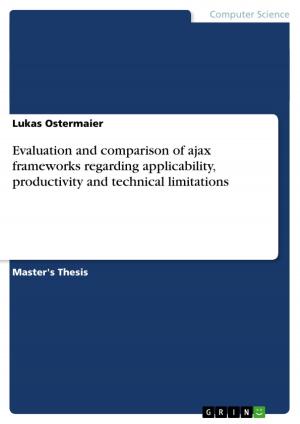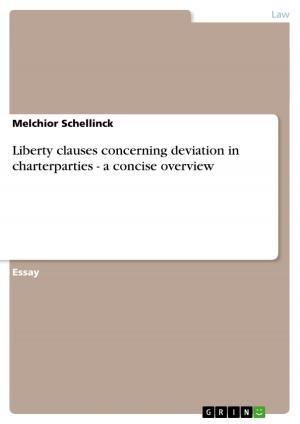| Author: | Ralf Erdhütter | ISBN: | 9783638380829 |
| Publisher: | GRIN Publishing | Publication: | May 25, 2005 |
| Imprint: | GRIN Publishing | Language: | English |
| Author: | Ralf Erdhütter |
| ISBN: | 9783638380829 |
| Publisher: | GRIN Publishing |
| Publication: | May 25, 2005 |
| Imprint: | GRIN Publishing |
| Language: | English |
Essay from the year 2005 in the subject Politics - International Politics - Region: Western Europe, grade: sehr gut, Eötvös Loránd University, course: EU-Law, 14 entries in the bibliography, language: English, abstract: Since the post-war period, and since the Elysée Treaty was signed in 1963, the Franco-German relationship has been and continues to be the driving force in Europe. The co-operation between the governments is extraordinarily close and institutionalized due to the Elysée Treaty and its amendment of 1988. To name just a few examples: • half- yearly government consultations (summits), which, since 1999, have focused on current topics of society in both countries and therefore go beyond simple co-operation between governments, • the German-French Security and Defense Council, • the Councils for Economic, Financial and Environmental Affairs and • the coordinators for German-French co-operation, which devote most of their attention today to the field of civil society In addition, since the beginning of 2001, heads of state and government and the foreign ministers of both countries have been holding informal meetings every 6-8 weeks for open and intense discussion on current topics of European and international interest (Blaesheim talks). Both countries have played a pioneering role in defense policy by founding the Eurocorps and both are actively participating in the creation of a European Security and Defense Policy. And Germany and France are each other's most important partners in international co-operation on armaments. France is Germany's closest and most important partner in Europe. With no other country does it coordinate all its policies more extensively or regularly. With the joint plenary session of the German Bundestag and the National Assembly on the 40th anniversary of the signing of the Elysée Treaty, the parliaments reaffirmed and stepped up their close cooperation, including: [...
Essay from the year 2005 in the subject Politics - International Politics - Region: Western Europe, grade: sehr gut, Eötvös Loránd University, course: EU-Law, 14 entries in the bibliography, language: English, abstract: Since the post-war period, and since the Elysée Treaty was signed in 1963, the Franco-German relationship has been and continues to be the driving force in Europe. The co-operation between the governments is extraordinarily close and institutionalized due to the Elysée Treaty and its amendment of 1988. To name just a few examples: • half- yearly government consultations (summits), which, since 1999, have focused on current topics of society in both countries and therefore go beyond simple co-operation between governments, • the German-French Security and Defense Council, • the Councils for Economic, Financial and Environmental Affairs and • the coordinators for German-French co-operation, which devote most of their attention today to the field of civil society In addition, since the beginning of 2001, heads of state and government and the foreign ministers of both countries have been holding informal meetings every 6-8 weeks for open and intense discussion on current topics of European and international interest (Blaesheim talks). Both countries have played a pioneering role in defense policy by founding the Eurocorps and both are actively participating in the creation of a European Security and Defense Policy. And Germany and France are each other's most important partners in international co-operation on armaments. France is Germany's closest and most important partner in Europe. With no other country does it coordinate all its policies more extensively or regularly. With the joint plenary session of the German Bundestag and the National Assembly on the 40th anniversary of the signing of the Elysée Treaty, the parliaments reaffirmed and stepped up their close cooperation, including: [...















